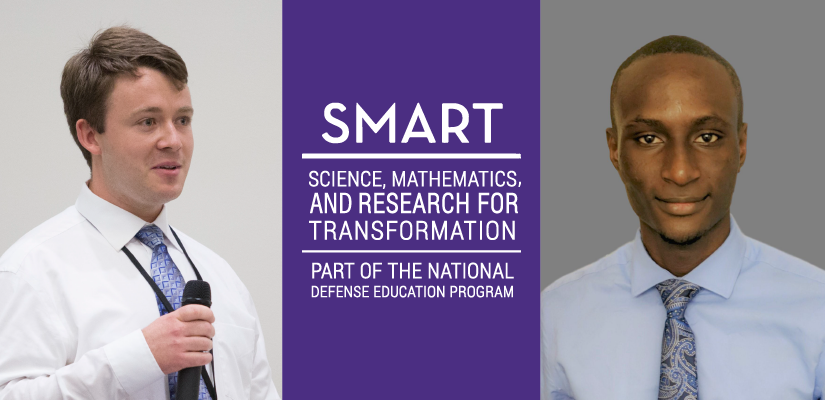A junior who built his first radio in ninth grade and a senior with a penchant for updating old-school computer systems are VCU’s 2019-2020 recipients of the Science, Math and Research for Transformation (SMART) scholarship, an award established by the U.S. Department of Defense (DoD) to support the country’s top science and engineering students.
As SMART Scholars, junior Papa Beye and senior Michael Kimbrough, both computer engineering majors, receive full tuition, $25,000 annual stipends, summer research internships and post-graduation civilian employment with DoD agencies.
The automator: Papa Beye
Papa Beye started studying engineering long before coming to VCU Engineering. “Ever since I was 13, I’ve been trying to increase my knowledge,” he said. Around that time, Beye’s family migrated from Senegal to Virginia Beach. He kept reaching for every opportunity to design electronics.
By the end of high school, he had built robots, learned three programming languages and created a remote-control car using a PlayStation controller. Beye then had his choice of college engineering programs.
“My first choice was computer engineering, and I really liked VCU’s program. I also liked that when I was researching schools, I saw a lot of diversity at VCU. People seemed inclusive and forward-thinking,” he said. “And they are."
Beye is part of a team designing unmanned aerial vehicles (UAVs) through the VCU Engineering’s Vertically Integrated Projects (VIP) program, which brings together undergraduates, grad students and faculty members for multi-year research projects.
That was great preparation for his internship with the Naval Surface Warfare Center in Dahlgren, Virginia, last summer. Tasked with updating READMEs, the ongoing documentation of all files in a software system’s directory, Beye developed a better way to update these files in the future.
“I wrote a program that goes into the code to scan for topics, finds their descriptions and puts them in a table. Whenever new descriptions are added to this software, the READMEs will be written autonomously,” he said.
After graduation, he plans to make his career in the military.
“Growing up in Virginia Beach, the Navy is all around you,” he said. “But I didn’t know if there were a position that went with my skills. Once I saw the possibilities in autonomous systems, I said, ‘Yeah, that’s right up my alley.’”
He credits Laura Lemza, VCU Engineering’s assistant director of career and industry advising, with helping him find and pursue opportunities — a fact she found surprising.
“You know, this young man really doesn’t need any help,” she said. “He’s self-possessed. He has great focus. He just knows where he’s going. He’s on that trajectory.”
Engineer Ben Goldman, Beye’s supervisor at Dahlgren, agreed.
“He was able to contribute at as high a level as I would expect from someone coming out of college — if not even more experienced,” Goldman said. Noting Beye’s passion for the subject in and out of class, he added, “Engineering isn’t just something he does in the classroom.”
Make it modern: Michael Kimbrough
For Kimbrough, the SMART scholarship has been a source of motivation to continue to do well as he finishes college. “It’s a vote of confidence, and I want to live up to it,” he said in a recent interview. “No senioritis,” he added with a laugh.
Kimbrough started college as a math major at a private university. When he totaled the real numbers, he saw it would cost more than $200,000 to complete a bachelor’s there. After earning his associate’s degree in engineering at John Tyler Community College, he came to VCU Engineering.
He had his first taste of working as an engineer with the military when he interned at NASA Langley Research Center between community college and VCU. There, Kimbrough was part of a team working on models and simulations to determine how spacecraft materials degrade when exposed to contaminants.
NASA had developed an excellent tool to run these simulations, but it was written in a programming language so obsolete it’s no longer taught. Kimbrough helped translate that program into MATLAB, a widely used language.
“He took it upon himself to understand the inner workings of the algorithms and the math behind behind the tool,” said Elaine Seasly, D.Eng., who supervised him at NASA Langley. “He wasn’t just updating the language, but really understanding what was going on under the hood to make sure the tool’s calculations were correct.”
Kimbrough recently completed an internship with Dominion Energy that also called on his computer updating skills. He supported a team at the North Anna Power Station that was preparing a business case for updating controls from analog to digital.
“Right now, there are thousands of different buttons and controls in the control room — it’s like the webs of wires you would see in a ‘70s movie about nuclear power stations. But they’re still reliable and they’re analog, which makes them less susceptible to cybersecurity problems,” he said. “We were demonstrating that you could put all the controls on one network, not a wireless server. Then, someone would literally have to get inside the plant to tamper with it.”
